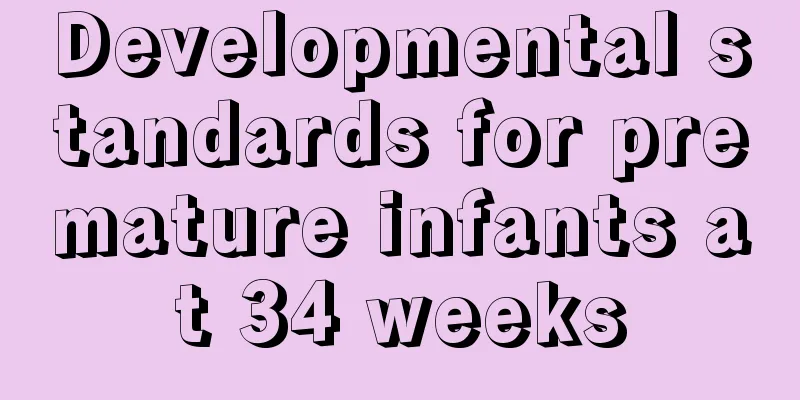Developmental standards for premature infants at 34 weeks

|
Premature babies born at 34 weeks are also relatively common. It mainly refers to the birth of immature babies. At this time, the child's various physical indicators are not fully developed and need more careful care. Sometimes the child has a poor physical condition and needs to stay in the incubator for a period of time. The child can be discharged from the hospital only when his physical condition fully meets the standards. Let’s take a look at this aspect. Developmental standards for premature infants at 34 weeks Premature babies, also known as immature babies, refer to live born babies with a gestational age of less than 37 weeks. The maturity and function of their tissues and organs are poorer than those of full-term babies, so they require more patience and careful care to reduce their mortality rate. Premature babies are generally in good condition, have good breastfeeding, weigh about 2300g, have no symptoms of anemia or other nutritional deficiencies, and can maintain normal body temperature at room temperature of 21-24℃. They can be discharged from the hospital. Post-discharge care for premature infants 1. Prepare necessary equipment: such as oxygen cylinders (machines), suction tubes, feeding tubes and empty feeding needles, etc., depending on the baby's condition when discharged from the hospital, and need to be prepared in advance before discharge. 2. Become proficient in clearing phlegm from the chest and back: This is beneficial for premature babies with poor lungs and trachea. 3. Feeding amount: For babies who have just been discharged from the hospital and returned home, the amount of food for each meal should be maintained at the original amount in the hospital during the first two or three days. There is no need to increase the amount after the baby adapts to the environment at home, because the change of environment has a great impact on the baby, especially the gastrointestinal function. 4. Feeding method: Generally, the feeding method is to feed the baby in small amounts with large meals and intermittently. After every minute of feeding, take the bottle out of the baby's mouth to allow the baby to breathe smoothly for about ten seconds, and then continue feeding. Such intermittent feeding can reduce the occurrence of spitting up or breathing pressure. 5. Go back to the hospital regularly for follow-up examinations and treatments: such as vision and hearing, jaundice, cardiopulmonary, gastrointestinal digestion, brain ultrasound, nutritional consultation, and preventive injections. After the introduction of the above content, I believe everyone has a certain understanding of the discharge criteria for premature babies at 34 weeks. If mothers really give birth to premature babies, they don’t have to worry too much about whether the baby will be much worse in development than a full-term baby. As long as they are well cared for in the hospital and meet certain standards, they can catch up with the development of a full-term fetus. |
<<: Is there any evidence that premature babies are smart?
>>: Injections to boost lung function in premature infants
Recommend
The child's nose is blocked when lying down
If you have a stuffy nose while sleeping, it is a...
Symptoms of indigestion in newborns
We all know that the digestive ability of newborn...
What should I do if my child can't roll over at five months old?
We all know that many children can roll over by t...
How to care for newborns during the recovery period of pneumonia?
For newborns, the body's immunity is very poo...
What are the clinical manifestations of infantile head hematoma?
Many children have swollen heads after birth, whi...
What should I do if my 50-day-old baby is restless while sleeping?
Sleep is very important for children. High-qualit...
Tips for treating colds in five-month-old babies
Children are actually very easy to catch colds. I...
Can children eat grapefruit when they have diarrhea?
I believe that for many parents, in addition to p...
Is it normal for a nine-year-old girl to start developing breasts?
If a nine-year-old girl starts to develop breasts...
How many times a day is normal for a baby to poop?
Newborn babies have to adapt to the outside envir...
Ways to encourage your baby to speak
There are rules for when children should start ta...
One-year-old baby does not like to drink milk and related situations
It is normal for a one-year-old baby not to like ...
What to do if your child has a dry nose? These methods can solve it
The air is very dry in autumn and winter, and man...
White discharge from the urethra of a baby boy, most parents do not take good care of it
Whether it is a boy or a girl, the health of the ...
The characteristics of children from single-parent families are actually these
The education of children from single-parent fami...









